|
By Laura Boggess When I was small, I would run as fast as I could with arms outstretched, letting the wind collect under makeshift wings. I was an airplane, a bird, or a dragon, flying over vast kingdoms. When the moon peeked through the dark at night, these wings would take me from my bed up into the sky, through stardust and past fiery comets—the curtains of the heavens opening wide to receive me. And I would meet with God—fly straight into his arms and let him rock me to sleep in his great lap. As I grew up, I learned the limits of our natural world. The world grew smaller, and God seemed light years away. I came to understand that faith is being certain of what we do not see,1 and my childhood nighttime meetings with an unseen God faded to a sweet memory. More and more, my knowledge increased and my faith grew; yet, more and more, I longed for that close communion of long ago. A few years ago, I went walking with my two young sons on a snowy evening. I remember how they ran ahead, lost in the tumbling play that only brothers know, leaving me in a wake of laughter. I stood alone under that white sky and looked up. Was it true that I once flew through these same heavens; cheeks flushed and eyes pools of starlight? When did I stop believing that with God all things are possible? Or, rather, when did my imagination become so small that I stopped expecting the seemingly impossible? When did my feet become so rooted to the crust of the earth that I let gravity weigh down my idea of who God is? It could have been when I turned seven or eight years old. At least, that’s what Jean Piaget’s theory of cognitive development would suggest. He claimed that the preoperational stage of thinking, which spans approximately ages 2–7, is characterized by the development of symbolic thinking, memory and imagination—all of which allow engagement in rich make-believe play. This thinking, based on intuition instead of logic, makes it difficult to grasp cause and effect, time, and comparison. Experts view this as a limitation, but my dictionary defines intuition as an insight into truth that is not perceived by the conscious mind. That sounds to me like the place where the Holy Spirit touches my consciousness—steering me this way or that. The world may view that as a limitation, but I wonder… When our brains reach that stage when they are capable of logic, do the wonder structures in our brains have to shrink to make room? If so, how can we expand them again? How can we grown-ups, long past Piaget’s preoperational stage, recover the wild joy of wonder? How can I revisit that place where the Holy Spirit begins to touch my conscious and steer me again, offering his intuition and insight? Jesus tells us in Matthew 18 that unless we become like little children we will never enter the kingdom of heaven. Whoever humbles himself like this child is the greatest in the kingdom of heaven, he said. What might that look like? How do I come to Jesus like a child? One answer came that cold day in February—lifted with laughter on the snow. Play. But what would play look like in my grown-up world? In his book Play: How it Shapes the Brain, Opens the Imagination, and Invigorates the Soul, Dr. Stuart Brown says when we engage in true play, our sense of self-consciousness diminishes and we lose track of time. Play allows us to live fully in each moment. I start to practice play, losing myself completely, standing at the window, watching a goldfinch peel a sunflower seed. Hours spent pulling weeds in the vegetable garden pass like seconds—the scent of the tomato plant leaves intoxicates. And when the sun shines on water, leaving a rosy trail behind her, I’m drawn into the passage of light through water. Play reminds me how it feels to be a child—innocent, everything new. God is inviting me to play each time he points my heart to beauty. That evening in the snow, my sons’ laughter echoing through the streets, I felt the internal prompting. I felt the invitation. Once again, I lifted my arms up to my sides—stretched out my wings. This fortyish mama let herself glide in circles, let the wind collect under makeshift wings. And I flew. Straight into the arms of God. * Play looks different for each person. What simple, playful activities fit your personality and can help you connect with God more intimately, becoming like little children? Courtesy of Anchor; reused with permission. Photo by Lesley Show via Flickr.
0 Comments
Flor Cordoba My four-year-old son, Ricardo, is “on the Lego trip.” Maybe it’s his age or the fact that he’s artistic and loves building things, but not a single day goes by that I don’t find him building something with his Lego. Sometimes I sit with him and build too. I am quite impressed with his cars, spaceships, and whatnot, so I put up with the fact that I have to go hunting around the house for tiny missing pieces almost every day. One day he came running to show me a new spaceship he had built, and accidentally bumped it against a doorway. The hapless little spaceship was thrown into what seemed a thousand pieces that went everywhere—across the floor and under the table, chairs, couches, and every other hard-to-get-at place in the room. Ricardo’s face registered total dismay. I tried to comfort him. “It’s okay. Now you can build another one and I’m sure it will be even better. Don’t get discouraged. Just pick up the pieces and build a new one.” But poor Ricardo was so downcast that he said he wasn’t going to try again. He slowly picked up the pieces and went to put them away. A few minutes later, he came bounding back with a brand-new spaceship. “You were right, Mom,” he said. “This is way better than the last one!” I was so proud of my little boy, and it taught me a lesson. How many times have I worked to build a dream, only to have it fall to pieces! Picking up the pieces and starting over is often even harder than getting started the first time, but with the faith of a little child, all things—even better things—are possible. Article courtesy of Motivated magazine. Used with permission. Photo by Mark Anderson via Flickr.
By Tomoko Matsuoka At a primary school, during their weekly class on morals, some first-grade students were asked to finish the story of the hard-working ant and the lazy grasshopper in the way they thought would be best. Most of us know this story—one of Aesop’s fables—of how the Grasshopper wasted the summer months playing his fiddle while the Ant labored hard storing food for the winter. When cold finally came, the industrious Ant and his friends were all safely tucked away with all that they would need, while the Grasshopper was left to search for food and found himself dying of hunger. The six-year-olds were asked to draw a picture of and rewrite the ending of the story in any way they would like, but it needed to involve the Grasshopper asking the Ant for help. About half of the first-graders took the general view that since the Grasshopper was undeserving, the Ant refused to help him. The other half changed the end to say that the Ant told the Grasshopper to learn his lesson, and then he gave the Grasshopper half of what he had. Then a little boy stood up and gave this version of the tale: After the Grasshopper came to the Ant and begged for food, the Ant unhesitatingly gave all the food he had. Not half or most, but everything. The boy was not finished, however, and cheerfully continued, “The Ant didn’t have any food left, so he died. But then the Grasshopper was so sad that the Ant had died that he told everyone what the Ant had done to save his life. And the Grasshopper became a good Grasshopper.” Two things came to mind when this story was related to me. First, it reminded me what giving meant to Jesus. He didn’t go halfway for us, and He didn’t say we were “undeserving,” but He gave His all so that we could learn to “be good.” It was only through His total sacrifice that we were able to receive the gift of eternal life. It was just the way the Ant died for the Grasshopper in the six-year-old’s retelling of the classic tale. And for us it should also not end there. In gratitude, we should follow His example and give our all to tell of the wonderful thing He did for us. Second, I learned what it means to give your all. It is not true giving unless it hurts, but when you do truly give, it will be multiplied many times over. Article excerpted from Activated! magazine. Used with permission. Photo courtesy of Wikimedia Commons.
D.B. Berg It pays to be as a little child. In fact, Jesus said, “Unless you … become as little children, you will by no means enter the kingdom of Heaven” (Matthew 18:3) and, “Let the little children come to Me, and do not forbid them; for of such is the kingdom of God” (Mark 10:14). We’re to be like little children—loving, sweet, simple believers, in childlike faith believing and receiving all that the Lord has for us. Children are samples of the citizenry of Heaven, like little angels dropped from the sky. They’re so fresh from Heaven that they understand prayer and other spiritual matters better than most adults. They talk to God and He talks to them. It’s that simple. They have no problem at all getting His ear with their pure, simple, childlike faith. It is given to children to be rich in faith. Faith just comes naturally to them. They have faith to believe anything God says, and with them nothing is impossible. The problem with many grown-ups is that they know too much. They’ve been educated out of their childlike faith. But there are others of trusting childlike faith who are daily doing things that doubting intellectuals say can’t be done. So be like a little child, and anything wonderful can happen! Courtesy of Activated magazine. Used with permission. The surgeon sat beside the boy’s bed; the boy’s parents sat across from him.
“Tomorrow morning,” the surgeon began, “I’ll open up your heart. …” “You’ll find Jesus there,” the boy interrupted. The surgeon looked up, annoyed. “I’ll open up your heart as we begin the operation,” he continued, “to see how much damage has been done…” “But when you open up my heart, you’ll find Jesus in there.” The surgeon looked to the boy’s parents, who sat quietly. “When I see how much damage has been done, I’ll close your heart and chest back up, and I’ll plan what to do next.” “But you’ll find Jesus in my heart. The Bible says He lives there. The hymns all say He lives there. You’ll find Him in my heart.” The surgeon had had enough. “I’ll tell you what I’ll find in your heart. I’ll find damaged muscle, low blood supply, and weakened vessels. And I’ll find out if I can make you well.” “You’ll find Jesus there too. He lives there.” The surgeon left. After the surgery, the surgeon sat in his office, recording his notes. “Damaged aorta, damaged pulmonary vein, widespread muscle degeneration. “No hope for transplant. No hope for cure. Therapy: painkillers and bed rest. Prognosis …” Here he paused, “… death within one year.” He stopped the recorder, but there was more to be said. “Why?” he asked aloud. “Why, God, did You do this? You’ve put this boy here. You’ve put him in this pain, and You’ve cursed him to an early death. Why?” The Lord answered and said, “The boy, My lamb, was not meant for your flock for long, for he is a part of My flock, and will forever be. Here, in My flock, he will feel no pain, and he will be comforted as you cannot imagine. His parents will one day join him here, and they will know peace, and My flock will continue to grow.” The surgeon’s tears were hot, but his anger was hotter. “You created that boy, and You created that heart. He’ll be dead in months. Why?” The Lord answered, “The boy, My lamb, shall return to My flock, for he has done his duty: I did not put My lamb with your flock to lose him, but to retrieve another lost lamb.” The surgeon wept. Later, the surgeon sat beside the boy’s bed; the boy’s parents sat across from him. The boy awoke and whispered, “Did you cut open my heart?” “Yes,” said the surgeon. “What did you find?” asked the boy. “I found Jesus there,” said the surgeon. - Author Unknown By Lloyd Glenn Last summer my family had a spiritual experience that had a lasting and profound impact on us, one we feel must be shared. It’s a message of love. It’s a message of regaining perspective, and restoring proper balance and renewing priorities. In humility, I pray that by relating this story I might give you a gift my little son, Brian, gave our family one summer day last year. On July 22nd I was en route to Washington, D.C. for a business trip. It was all so very ordinary, until we landed in Denver for a plane change. As I collected my belongings from the overhead bin, an announcement was made for Mr. Lloyd Glenn to see the United Customer Service Representative immediately. I thought nothing of it until I reached the door to leave the plane and I heard a gentleman asking every male if he were Mr. Glenn. At this point I knew something was wrong and my heart sank. When I got off the plane a solemn-faced young man came toward me and said, “Mr. Glenn, there is an emergency at your home. I do not know what the emergency is or who is involved, but I will take you to the phone so you can call the hospital.” My heart was now pounding, but the will to be calm took over. Woodenly, I followed this stranger to the distant telephone where I called the number he gave me for the Mission Hospital. My call was put through to the trauma center where I learned that Brian, my three-year-old son, had been trapped underneath the automatic garage door for several minutes, and that when my wife had found him he was dead. CPR had been performed by a neighbor, who is a doctor, and the paramedics had continued the treatment as Brian was transported to the hospital. By the time of my call, Brian was revived and they believed he would live, but they did not know how much damage had been done to his brain, or to his heart. They explained that the door had completely closed on his little sternum right over his heart. He had been severely crushed. After speaking with the medical staff, my wife sounded worried but not hysterical, and I took comfort in her calmness. The return flight seemed to last forever, but finally I arrived at the hospital six hours after the garage door had come down. When I walked into the intensive care unit, nothing could have prepared me to see my little son lying so still on a great big bed with tubes and monitors everywhere. He was on a respirator. I glanced at my wife, who stood and tried to give me a reassuring smile. It all seemed like a terrible dream. I was filled in on the details and given a guarded prognosis. Brian was going to live, and the preliminary tests indicated that his heart was okay, two miracles in themselves. But only time would tell if his brain had received any damage. Throughout the seemingly endless hours, my wife was calm. She felt that Brian would eventually be all right. I hung on to her words and faith like a lifeline. All that night and the next day Brian remained unconscious. It seemed like forever since I had left for my business trip the day before. Finally at two o’clock that afternoon, our son regained consciousness and sat up, uttering the most beautiful words I have ever heard spoken. He said, “Daddy, hold me,” and he reached for me with his little arms. By the next day he was pronounced as having no neurological or physical deficits, and the story of his miraculous survival spread throughout the hospital. You cannot imagine our gratitude and joy. As we took Brian home we felt a unique reverence for the life and love of our Heavenly Father that comes to those who brush death so closely. In the days that followed there was a special spirit about our home. Our two older children were much closer to their little brother. My wife and I were much closer to each other, and all of us were very close as a whole family. Life took on a less stressful pace. Perspective seemed to be more focused, and balance much easier to gain and maintain. We felt deeply blessed. Our gratitude was truly profound. The story is not over! Almost a month later to the day of the accident, Brian awoke from his afternoon nap and said, “Sit down, Mommy. I have something to tell you.” At this time in his life, Brian usually spoke in small phrases, so to hear him say a sentence of that length surprised my wife. She sat down with him on his bed and he began his sacred and remarkable story. “Do you remember when I got stuck under the garage door? Well, it was so heavy and it hurt really bad. I called to you, but you couldn’t hear me. I started to cry, but then it hurt too bad. And then the ‘birdies’ came.” “The birdies?” my wife asked, puzzled. “Yes,” he replied. “The birdies made a whooshing sound and flew into the garage. They took care of me.” “They did?” “Yes” he said. “One of the birdies came and got you. She came to tell you I got stuck under the door.” A sweet reverent feeling filled the room. The spirit was so strong and yet lighter than air. My wife realized that our three-year-old had no concept of death and spirits, so he was referring to the beings who came to him from beyond as “birdies” because they were up in the air like birds that fly. “What did the birdies look like?” she asked. Brian answered, “They were so beautiful. They were dressed in white, all white. Some of them had green and white. But some of them had on just white.” “Did they say anything?” “Yes” he answered. “They told me the baby would be alright.” “The baby?” my wife asked, confused. Brian answered. “The baby laying on the garage floor.” He went on, “You came out and opened the garage door and ran to the baby. You told the baby to stay and not leave.” My wife nearly collapsed upon hearing this, for she had indeed gone and knelt beside Brian’s body, and seeing his crushed chest, knowing he was already dead, she looked up around her and whispered, “Don’t leave us, Brian. Please stay if you can.” As she listened to Brian telling her the words she had spoken, she realized that the spirit had left his body and was looking down from above on this little lifeless form. “Then what happened?” she asked. “We went on a trip,” he said, “far, far away.” He grew agitated, trying to say the things he didn’t seem to have the words for. My wife tried to calm and comfort him, and let him know it would be okay. He struggled with wanting to tell something that obviously was very important to him, but finding the words was difficult. “We flew so fast up in the air. They’re so pretty, Mommy.” He added. “And there are lots and lots of birdies.” Brian went on to tell her that the “birdies” had told him that he had to come back and tell everyone about them. He said they brought him back to the house and that a big fire truck and an ambulance were there. A man was bringing the baby out on a white bed and Brian tried to tell the man that the baby would be okay, but the man couldn’t hear him. He said the birdies told him he had to go with the ambulance, but they would be near him. He said they were so pretty and so peaceful, and he didn’t want to come back. Then the bright light came. He said that the light was so bright and so warm, and he loved the bright light so much. Someone was in the bright light and put their arms around him, and told him, “I love you, but you have to go back. You have to play baseball, and tell everyone about the birdies.” Then the person in the bright light kissed him and waved bye-bye. Then woosh, the big sound came and they went into the clouds. The story went on for an hour. He taught us that “birdies” were always with us, but we don’t see them because we only look with our eyes and we don’t hear them because we only listen with our ears. “But they are always there, and you can only see them in here (he put his hand over his heart). They whisper things to help us to do what is right because they love us so much.” Brian continued, stating, “I have a plan, Mommy. You have a plan. Daddy has a plan. Everyone has a plan. We must all live our plan and keep our promises. The birdies help us to do that ’cause they love us so much.” In the weeks that followed, Brian often came to us and told all, or part of it again and again. Always the story remained the same. The details were never changed or out of order. A few times he added further bits of information and clarified the message he had already delivered. It never ceased to amaze us how he could tell such detail and speak beyond his ability when he spoke of his “birdies.” Everywhere he went, he told strangers about the “birdies.” Surprisingly, no one ever looked at him strangely when he did this. Rather, they always got a softened look on their faces and smiled. Needless to say, we have not been the same ever since that day, and we pray we never will be. Image courtesy of Tina Phillips at FreeDigitalPhotos.net
By Robert Peterson She was six years old when I first met her on the beach near where I live. I drive to this beach, a distance of three or four miles, whenever the world begins to close in on me. She was building a sand castle or something and looked up, her eyes as blue as the sea. “Hello,” she said. I answered with a nod, not really in the mood to bother with a small child. “I’m building,” she said. “I see that. What is it?” I asked, not caring. “Oh, I don’t know, I just like the feel of sand.” That sounds good, I thought, and slipped off my shoes. A sandpiper glided by. “That’s a joy,” the child said. “It’s a what?” “It’s a joy. My mama says sandpipers come to bring us joy.” The bird went gliding down the beach. “Good-bye, joy,” I muttered to myself, “hello, pain,” and turned to walk on. I was depressed; my life seemed completely out of balance. “What’s your name?” She wouldn’t give up. “Robert,” I answered. “I’m Robert Peterson.” “Mine’s Wendy. … I’m six.” “Hi, Wendy.” She giggled. “You’re funny,” she said. In spite of my gloom I laughed too and walked on. Her musical giggle followed me. “Come again, Mr. P.,” she called. “We’ll have another happy day.” The days and weeks that followed belong to others: a group of unruly Boy Scouts, PTA meetings, an ailing mother. The sun was shining one morning as I took my hands out of the dishwater. “I need a sandpiper,” I said to myself, gathering up my coat. The ever-changing balm of the seashore awaited me. The breeze was chilly, but I strode along, trying to recapture the serenity I needed. I had forgotten the child and was startled when she appeared. “Hello, Mr. P.,” she said. “Do you want to play?” “What did you have in mind?” I asked, with a twinge of annoyance. “I don’t know. You say.” “How about charades?” I asked sarcastically. The tinkling laughter burst forth again. “I don’t know what that is.” “Then let’s just walk.” Looking at her, I noticed the delicate fairness of her face. “Where do you live?” I asked. “Over there.” She pointed toward a row of summer cottages. Strange, I thought, in winter. “Where do you go to school?” “I don’t go to school. Mommy says we’re on vacation.” She chattered little girl talk as we strolled up the beach, but my mind was on other things. When I left for home, Wendy said it had been a happy day. Feeling surprisingly better, I smiled at her and agreed. Three weeks later, I rushed to my beach in a state of near panic. I was in no mood to even greet Wendy. I thought I saw her mother on the porch and felt like demanding she keep her child at home. “Look, if you don’t mind,” I said crossly when Wendy caught up with me, “I’d rather be alone today.” She seemed unusually pale and out of breath, I thought. “Why do you want to be alone?” she asked. I turned to her and shouted, “Because my mother died!” and thought, My God, why am I saying this to a little child? “Oh,” she said quietly, “then this is a bad day.” “Yes,” I said, “and yesterday and the day before, and—oh, go away!” “Did it hurt?” she inquired. “Did what hurt?” I was exasperated with her, with myself. “When she died?” “Of course it hurt!” I snapped, misunderstanding, wrapped up in myself. I strode off. A month or so after that, when I next went to the beach, she wasn’t there. Feeling guilty, ashamed and admitting to myself I missed her, I went up to the cottage after my walk and knocked at the door. A drawn-looking young woman with honey-colored hair opened the door. “Hello,” I said. “I’m Robert Peterson. I missed your little girl today and wondered where she was.” “Oh yes, Mr. Peterson, please come in. Wendy spoke of you so much. I’m afraid I allowed her to bother you. If she was a nuisance, please accept my apologies.” “Not at all. She’s a delightful child,” I said, suddenly realizing that I meant it. “Where is she?” “Wendy died last week, Mr. Peterson. She had leukemia. Maybe she didn’t tell you.” Struck dumb, I groped for a chair. My breath caught. “She loved this beach, so when she asked to come, we couldn’t say no. She seemed so much better here and had a lot of what she called happy days. But the last few weeks, she declined rapidly. …” Her voice faltered. “She left something for you. … If only I can find it. Could you wait a moment while I look?” I nodded dumbly, my mind racing for something, anything, to say to this lovely young woman. She handed me a smeared envelope, with “MR. P” printed in bold, childish letters. Inside was a drawing in bright crayon hues—a yellow beach, a blue sea, and a brown bird. Underneath was carefully printed: A SANDPIPER TO BRING YOU JOY. Tears welled up in my eyes, and a heart that had almost forgotten to love opened wide. I took Wendy’s mother in my arms. “I’m so sorry, I’m sorry, I’m so sorry,” I muttered over and over, and we wept together. The precious little picture is framed now and hangs in my study. Six words—one for each year of her life—that speak to me of harmony, courage, undemanding love. A gift from a child with sea-blue eyes and hair the color of sand, who taught me the gift of love. Jessica Roberts I’ve worked with young children for years, and I never cease to be amazed at their hunger for life, joy of discovery, and perseverance. Yes, perseverance. That may come as a new thought, considering small children’s notoriously short attention spans. (Any mother who has tried to get her toddler to sit still long enough to finish a meal can tell you about that.) There are moments in every young child’s life, though, when the inborn urge for development drives the child to learn a new skill, such as picking up a small object with chubby little fingers, or crawling, or walking. These new skills require a huge amount of concentration and effort on the part of the child and a great deal of time compared to his or her short life up to that point. They also put physical demands on muscles that are just beginning to learn coordination and are barely strong enough to sustain the child’s weight. When I recently moved to a new country, I went through a difficult time of adjustment. My friends and co-workers in my former situation had become like family. It hurt to leave them, and I especially missed teaching and helping to care for their kids. I tried my hand at new aspects of our volunteer work, but felt I wasn’t good at any of them. At one point, for example, I channeled my energy into a toy-and-book drive for needy children, but when it was slow taking off, I grew discouraged and felt like giving up. One day I was caring for a co-worker’s baby, Rafael. For as long as I had known him, Rafael had been trying to crawl. He would start by pushing himself up on shaky arms and eventually get up on all fours, but then he would get stuck. This went on for weeks. He would push himself up and rock back and forth on his pudgy hands and knees, but not make any forward progress. If a toy was just out of his reach, no matter how much he rocked on all fours or wiggled on his belly, he wouldn’t get any closer. He sometimes managed to scoot himself backwards, but that only moved him further from his goal. This day, after trying his hardest, he looked at me with “Pick me up!” written in frustration on his little features. I could sympathize, as I felt just as frustrated in my new situation. I knew, though, that all that struggling was strengthening his muscles and teaching him about his body. So I picked him up and cuddled and encouraged him a bit, but then put him back on the floor to try again. He would have to learn to crawl on his own; I couldn’t do it for him. Eventually he would grow stronger and get the hang of it. Suddenly I realized how much like Rafael I was. I’d been struggling, trying to learn new jobs, a new language, and about a new culture, and my natural reaction had been to look up to Jesus and say “Pick me up! Save me from this!” But He knows that this time of learning, difficult as it may be, will make me stronger. So even though His love is always there to cheer me on, I have to do the work. I have to persevere. That gave me a new outlook on my situation. If Rafael can keep it up, then I will too! And when I grow weary of trying or get frustrated from seemingly futile effort, I’ll go to Jesus for love, encouragement, and the strength to keep learning the lessons life brings my way. Rafael is now happily crawling and starting to pull himself up to stand. I’m also taking baby steps in learning new skills and broadening my horizons. I know we’ll both be up and running before long, if we just keep trying. Excerpted from Activated magazine. Used with permission.
She must have been six years old, this beautiful brown-haired, freckled-faced image of innocence. Her mom had on a pair of tan shorts and a light blue knit shirt, with sneakers. She looked like a mom.
It was pouring outside—the kind of rain that gushes over the tops of rain gutters, so much in a hurry to hit the earth it has no time to flow down the spout. Drains in the nearby parking lot were filled to capacity or blocked. Huge puddles formed lakes around parked cars. We all stood there under the awning or just inside the door of the store. We waited—some patiently, others aggravated because nature messed up their hurried day. I am always mesmerized by rainfall. I get lost in the sound and sight of the heavens washing away the dirt and dust of the world. Memories of running and splashing so carefree as a child come pouring in as a welcome reprieve from the worries of my day. Her voice was so sweet as it broke the hypnotic trance we were all caught in. “Mom, let’s run through the rain,” she said. “What?” Mom asked. “Let’s run through the rain!” she repeated. “No, honey. We’ll wait until it slows down a bit,” Mom replied. This young child waited about another minute and repeated her statement. “Mom, let’s run through the rain.” “We’ll get soaked if we do,” Mom said. “No, we won’t, Mom. That’s not what you said this morning,” the young girl said as she tugged at her mom’s arm. “This morning? When did I say we could run through the rain and not get wet?” “Don’t you remember? When you were talking to Daddy about his cancer, you said, ‘If God can get us through this, He can get us through anything!’” The entire crowd became dead silent. You couldn’t hear anything but the rain. We all stood quietly. No one came or left in the next few minutes. Mom paused and thought for a moment about what she would say. Now some would laugh it off and scold the child for being silly. Some might even ignore what was said. But this was a moment of affirmation in a young child’s life. A time when innocent trust can be nurtured so that it will bloom into faith. “Honey, you are absolutely right. Let’s run through the rain. If God lets us get wet, well, maybe we just needed washing,” Mom said. Then off they ran. We all stood watching, smiling and laughing as they darted past the cars and through the puddles. They held their shopping bags over their heads just in case. They got soaked. But they were followed by a few believers who screamed and laughed like children all the way to their cars, perhaps inspired by their faith and trust. I want to believe that somewhere down the road in life, that mom will find herself reflecting back on moments they spent together, captured like pictures in the scrapbook of her cherished memories—the two of them running through the rain, believing that God would get them through. And yes, I ran too. I got wet. I needed washing. —Author unknown Image courtesy of Clare Bloomfield at FreeDigitalPhotos.net By Tomoko Matsuoka I wouldn’t have used this color in the wildest color scheme-a garish yellow that takes on a greenish tint when the light strikes it just right. But here it is, in sharp contrast to the muted red cover of my diary, a child’s shiny yellow rose sticker. Of all of the gifts I have ever received, I have treasured this one more than most. Thinking back, I can’t remember what my little sister had said that had gotten me in such a tizzy. All I remember is that she had been complaining, and I had lectured her severely. I hadn’t gone so far as enumerating every woe that the least fortunate child in the world might be experiencing at that very moment, but I had come close. After demanding an apology, I turned back to my book. A few quiet moments had passed when I heard rustling. I refused to look up. I wanted my little sister to feel the full effect of my righteous exasperation. Let her stew, I thought. The rustling continued. I willed myself to stay put, but I couldn’t help wondering what was absorbing her so completely. Another few moments passed, and then the patter of footsteps came up behind me. They stopped. Silence. I refused to look up from my book, but from the corner of my eye I caught a glimpse of her hand pushing an envelope onto the desk next to me. She turned and ran from the room. Curious, I flipped open the envelope. Something impossibly yellow tumbled onto my lap. It was a rose sticker. I flipped it over, and there in a five-year-old’s handwriting were the words, “I’m sorry. I love you.” In a preschooler’s barter economy, stickers are precious. And this was no ordinary sticker. Considering that to a child’s way of thinking, bigger is better, the brighter the better, and shiny is best of all, this big shiny rose sticker that had fallen into my lap had undoubtedly been the prize of her collection. I sat stunned for a moment at her boundless ability to love me despite my ornery self-centeredness. I found her, hugged her, and told her I was sorry. © The Family International. |
Categories
All
Archives
March 2024
LinksFree Children's Stories |
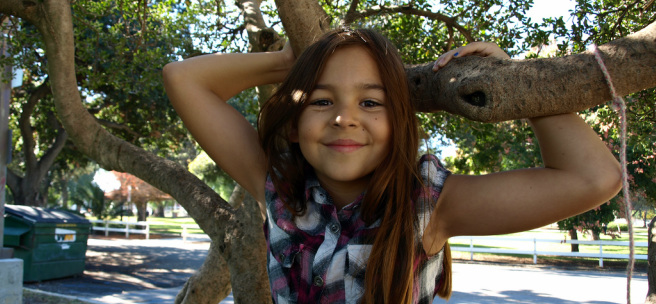
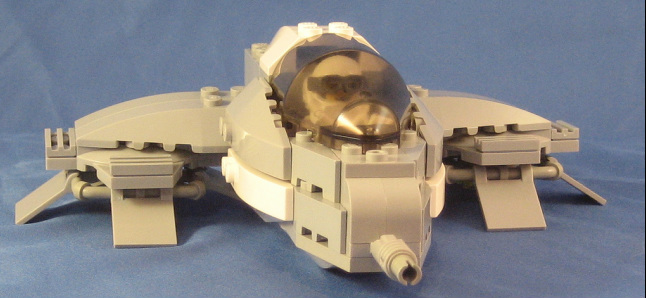
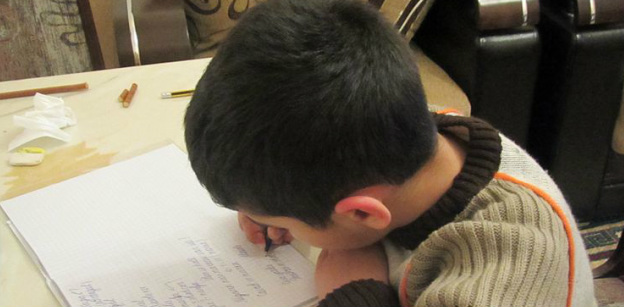
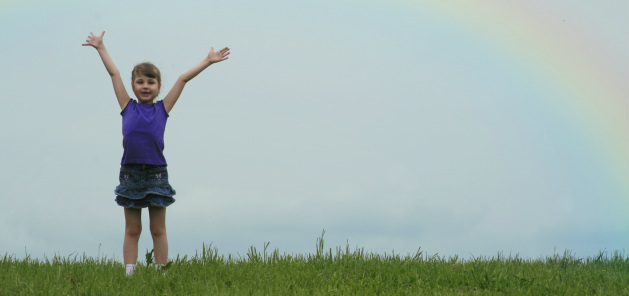
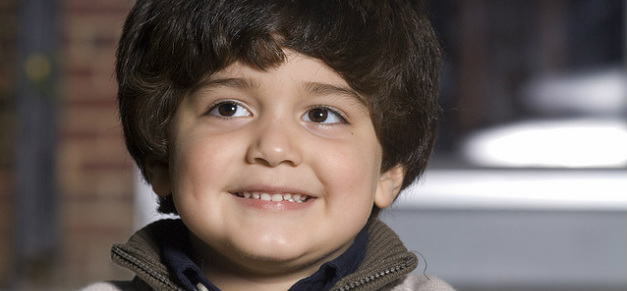
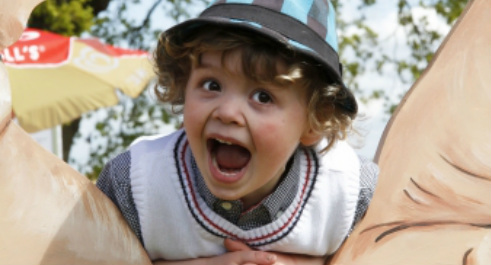
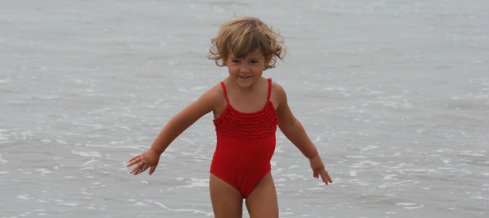

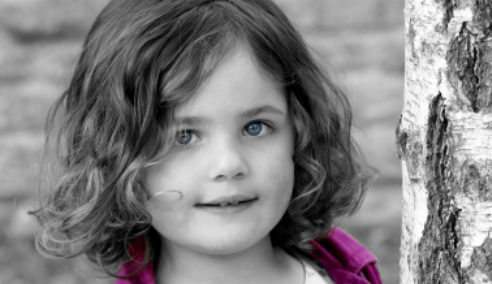
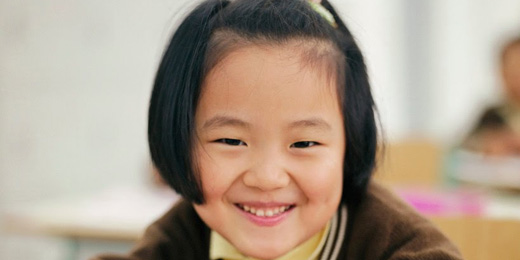

 RSS Feed
RSS Feed
